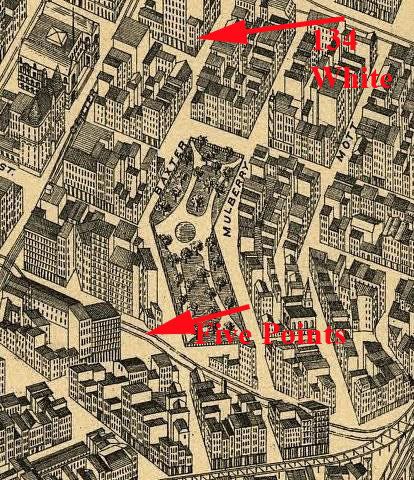
The map is from 1903. The web source of the article is the lost museum
This newspaper article describes the 1853 opening of the Five Points Mission House, a Methodist mission located in one of New York City’s most impoverished neighborhoods. The article illustrates the attitudes that motivated urban missionary work in an “infected district of the City” that was predominantly Catholic, and reflects how Protestant evangelism, poor relief, and reform went hand in hand during the antebellum era. The Five Points’ Mission House, erected on the site of the Old Brewery, was opened yesterday afternoon with religious services, as the centre of missionary and humanitarian enterprize in that infected district of the City. Notwithstanding the excessive inclemency of the weather, a very numerous and highly respectable audience, the majority of whom were ladies, assembled in the Chapel of the Mission House. The children of the schools attached to the Mission were also in the room, and sang some simple hymns during and after the services. Amongst the several clergymen who participated in the proceedings we noticed: Rev. Dr. Bangs, Dr. Floy, Rev. J. B. Wakeley, and S. Martin-Dale. Messrs. Heath and Devois, Missionaries on their way to California, were also among those present. After the usual religious exercises, the Rev. Dr. Floy (of the Madison street M. E. Church,) delivered an appropriate discourse . . .It should be borne in mind that the house they stood in was erected solely for the relief of the poor. Nor was all that toil and trouble expended merely that the wretched sons of want might there find a home; nor was it in order that the little children, once running wild through this most wicked quarter of this wicked city, might be taken in there and taught to read and write. Its object was not to supply merely temporal wants. It had a holier end in view—one that, in the present day, was too much forgotten—for at this very period there was a widely diffused kind of infidelity that would place the temporal benefits of the poor above their spiritual wants, and inculcated as the paramount duty, that to clothe the naked and feed the hungry were the first labors of Charity. It would be far from his intention to say anything against that kind of charity either. But he would go much further—he would have the Charity exhibited by the Redeemer, who, during this mission, labored more to supply the necessities of the immortal soul, than those of the frail mortal body. Charity such as that was simply the teaching of pure Christianity, and for such an object, primarily, that building had been erected. He yielded to no man in his firm devotion to that phase or form of Christianity which he, in his ministration, was called upon to preach, and at whose altars he was a listener. But he never would unite himself to such an undertaking if its objects were merely sectarian—the elevation of one sect over another, or the promotion of any form of religious bigotry. The object of the enterprise was not that men might be made Methodists, but that they might be made members of Christ’s Church, and walk in the way of His law. Then as of secondary importance their temporal wants might be supplied, and, subsequently, if they should seem it good to them to seek Heaven in the same path in which the Methodists do, so much the more certainly would harmony be insured. Dr. F. then went on to speak in regard to the civilizing influences of Christianity. The knowledge of Christian truth removed ignorance much more efficaciously than mere secular instruction. . . .Rev. J. B. Wakely briefly addressed the meeting, stating that the Society was at present in debt some $15,000, and urged its friends to be liberal and open-hearted in their contributions for its aid. . . .


























No comments:
Post a Comment